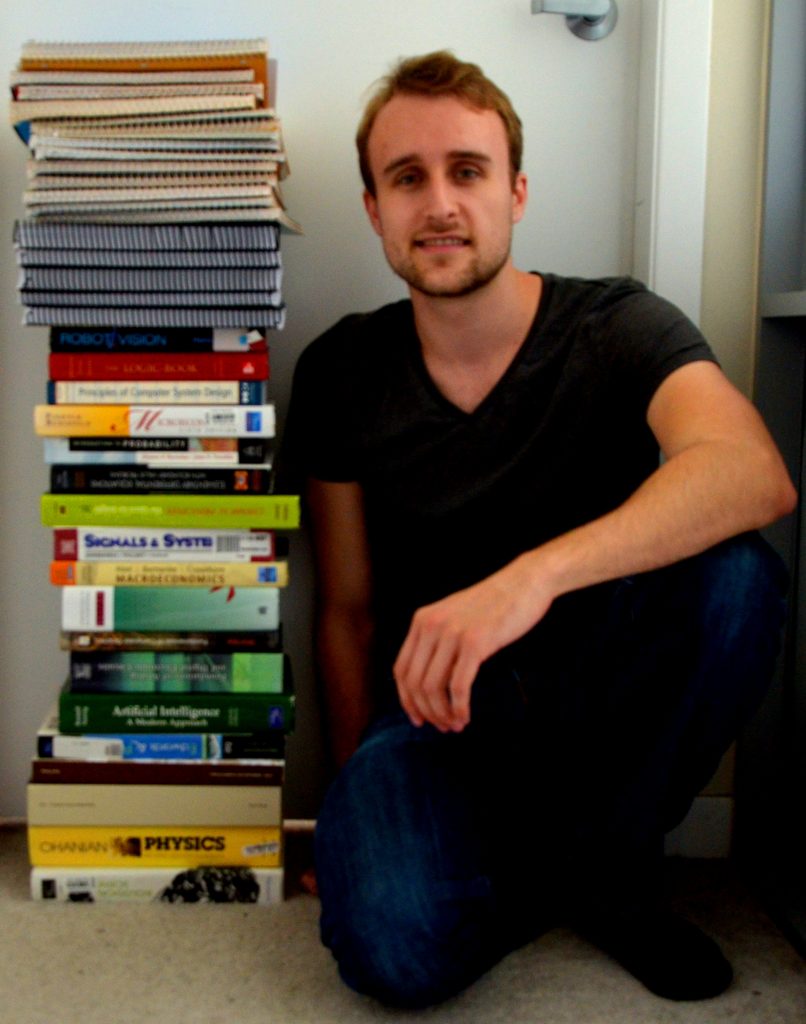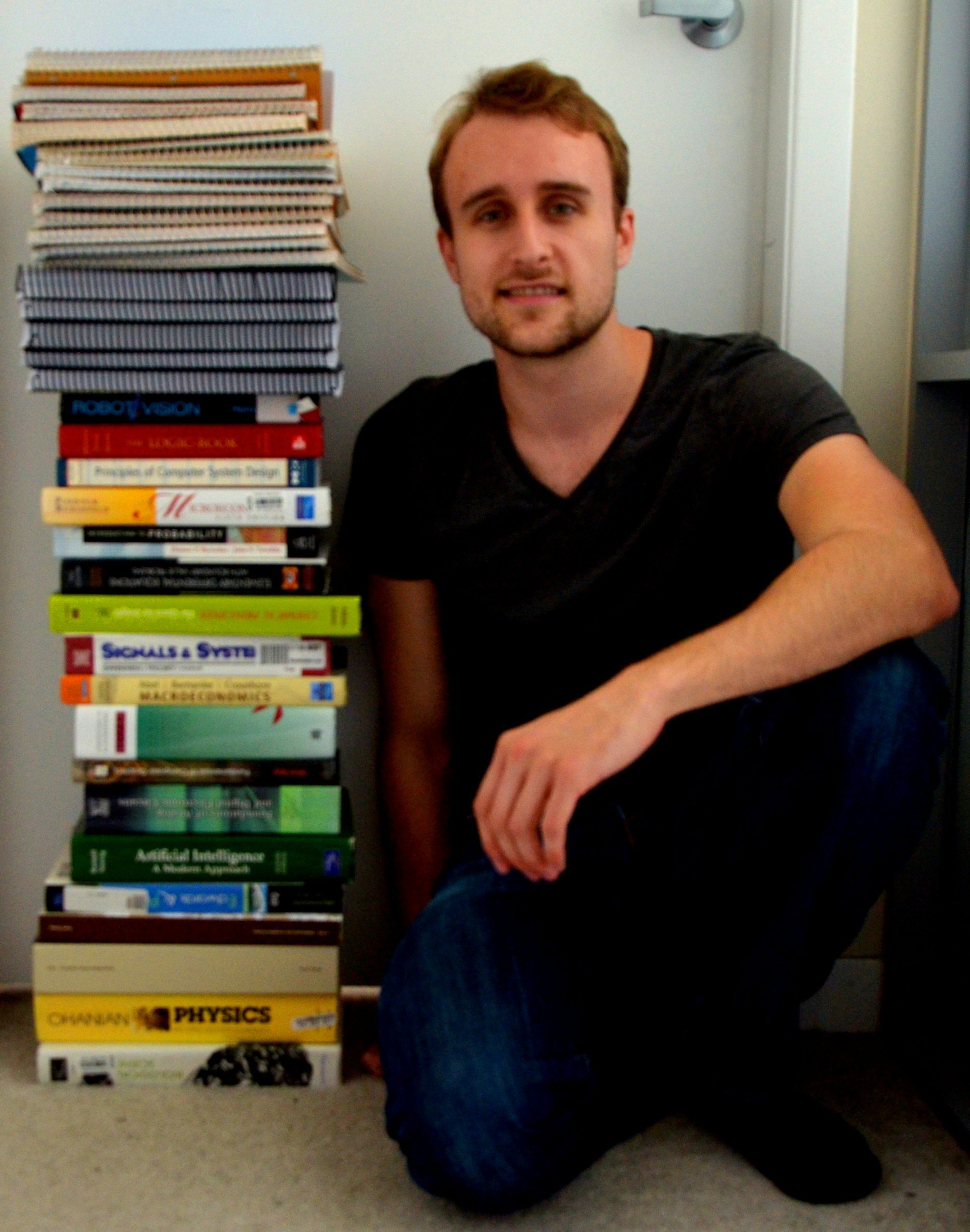Why focus will get you much more than talent ever will

He liked the concepts I was discussing on this site so much that he decided to apply them to his own studies in French. He had been learning for just six months, and it was his first foreign language, but I was really impressed that for the afternoon we hung out together (and the first time we met in person), we only spoke French together even though we actually had never specifically said we would via email. He did an excellent job at it too!
I later interviewed him about how he went about reaching such a level in just a few months and included it among the audio of the Speak from day 1 package. The “secret” that we discussed? FOCUS. It's how he managed to get so far in a relatively short time.
I enjoy his site a lot, so I was so thrilled to read that he had his very own intensive “mission” that he blogged about, in the same kind of spirit as my three month ones. He took on the epic challenge to learn the entire 4 year MIT computer science course in just one year (link includes how he went about it, the rules of his challenge, and his TEDx talk about it).
It was an epic challenge indeed, and best of all, a year later, he has succeeded. But rather than dismiss him as a savant/genius, I think he makes an excellent point for why it's something that many others could and should attempt themselves, or at least realize how their own projects are much more within reach than they realized if only they'd focus their time better.
In today's guest post, Scott shares his thoughts on that with us all, and since he's been reading my blog for years, he makes lots of comparisons to my own missions, explaining it better than I could in many cases! Over to you Scott!
The MIT challenge
It was number eighteen, and if I had ever wanted to quit, it was now. The class had no recorded lectures or textbook. All I had to go on was a set of old slides with cryptic acronyms and bulleted lists.
Despite this, I knew I’d need to finish all six projects over the next seven days if I was going to keep up. Six projects which culminated in a final task of building a CPU from scratch, only specifying how wires were connected in a simulator.
This was month six, working on the challenge of trying to pass the exams and finish the programming projects of MITs notorious 4-year computer science degree in one year. What started as an interesting, and perhaps slightly arrogant, project, had become an all-consuming quest.
Eventually, I did finish that class, along with the other 32. During the process I learned a lot about computer science, but I learned more about what enables us to see a learning project to completion.
The Distinction that Makes You Lazy or Disciplined
After having done a few projects, it surprises me how many people make basic mistakes when constructing their own self-education goals. These basic errors make their goals much harder to achieve, if not impossible.
Yet, after making these missteps, most people just blame themselves. They were too lazy. They will try harder next time. The same excuses, but little has changed from their method. There’s an old quote about insanity being trying the same thing and expecting different results.
The other reaction is to look at people like Benny, and claiming his impressive language abilities are because of some inherent gift. Even if you accept that he’s not just naturally gifted at languages, you may convince yourself that he’s just unnaturally disciplined which lets him succeed in his missions.
This behavior has a name in psychology, it’s called the fundamental attribution error. It’s a bias that human beings are more likely to blame fundamental personality traits for behaviors than the situational influences. Benny succeeds because he is disciplined. I fail because I’m lazy.
The error here is that situation matters—a lot. Benny may be a smart guy with a focused attitude, but he also has a lot of help. The way he structures his missions, and the pressures to keep producing results, avoids the basic mistakes most people make, so he doesn’t suffer from the setbacks regular people do.
In this article, I’d like to talk about one of those setbacks and why avoiding it can greatly increase your success rate learning a new language, subject or degree.
The Key is Focus
One feature conspicuous about almost all of Benny’s challenges: they only focus on one language. (Even the occasional challenge to maintain all of his already learned languages have been constrained under a single theme.)
What’s more, Benny’s goals are highly specific. Each mission has a concrete timeframe and a concrete outcome. My challenge was also clear: projects and exams, for all 33 classes of MIT’s computer science degree. Vague missions quickly become expansive ones as you try to do everything and end up accomplishing nothing.
Focus is a force multiplier for your effectiveness. Doing 3-4 “easy” learning goals is often much harder than doing just one “hard” goal. One of the biggest mistakes self-learners make is not reigning in their ambitions to pick just one project to work on at a time.
Focus works even better when you make your project highly specific.
When I was first learning French, I only thought in vague terms—I wanted to be fluent. Eventually I realized that was a lousy focus, so I made it more specific. I’d make particular projects such as being able to have a good one-on-one conversation, or being able to watch movies or read classic literature like Le Comte de Monte Cristo or Les Trois Mousquetaires.
Breaking down a language into short, mini projects made the process much less daunting, just as it later did when I broke the idea of learning computer science into thirty-three individual classes.
What if I Have a Lot of Interests?
I completely understand the reluctance to focus—what if you have a lot you want to learn. I feel exactly the same way. My formal education was in business, but I’ve studied psychology, nutrition, computer science, math, physics, economics and French.
The solution is twofold. First, make a mental distinction between how you see commitments versus interests. Second, take on your multiple interests sequentially as opposed to in parallel.
Commitments and Interests
The rule of focus doesn’t mean I need to willfully avoid everything outside of it. When I was learning French, that didn’t stop me from trying to pick up a bit of German while in Berlin, or a couple phrases in Spanish passing through Barcelona.
The distinction was that I wasn’t committed to Spanish or German. I could continue learning them if I wanted to, as an interest, but I wouldn’t force myself to. That exertion of willpower is only for the commitments in your life.
Keeping commitments minimal while having multiple interests means that you’re never constrained—you can always let your curiosity lead you, but you’re also not burned out by forcing yourself to keep up with too many projects.
Sequential and Parallel Commitments
The other way you can successfully juggle multiple projects is to do them serially, as opposed to in parallel. When I was working on computer science, my interest in taking on a new language or subject didn’t go away, I just made a mental note that it was something I could continueafterthis particular quest.
Benny’s commitments are often only 3 months, which lets him make substantial progress in a language, but it still allows him to have explored dozens of languages during his travels. This is precisely because he learns one language at a time, rather than all at once.
What if You Can’t Focus?
The rule of focus applies to your discretionary time and energy. Meaning the effort of which you have the ability to choose how you spend it. For some people, this might be significant—I was lucky enough to devote the majority of my time to my project. For others it might be more constrained. Work, family or school may always eat up a chunk of your time before you get to choose your goals.
But this rule applies even more so to the people with involuntary commitments. If your work or studies automatically consumes much of your time, then it’s even more important to apply your remaining free time efficiently.
Unfortunately, many people simply give up and decide that the free time that they do have is not enough.
Focus is not an unusual trick, but it is a seldom-applied one. Whether you want to learn a new language, or just understand the world one subject at a time, it’s also a tool you don’t want to forget.
If you enjoyed this article, click here to get a (free) rapid-learning ebook. This details the exact strategies Scott used learning MIT's 4-year computer science degree in 12 months. Also, make sure to share your thoughts on this with us in the comments below!



Social